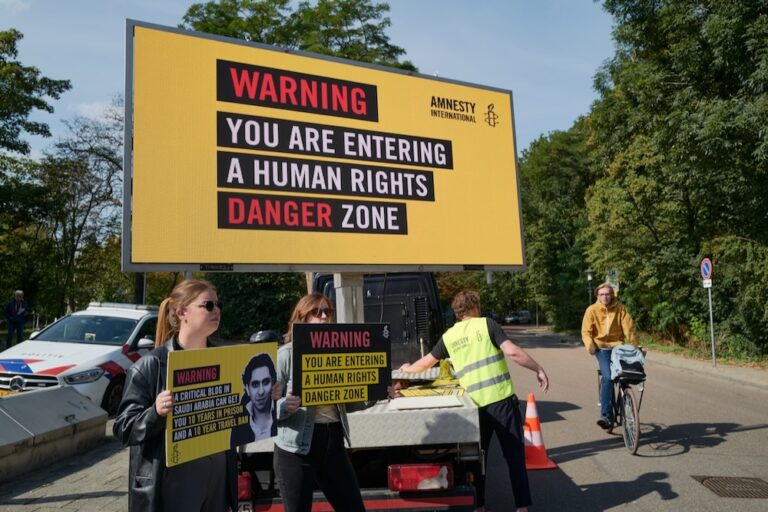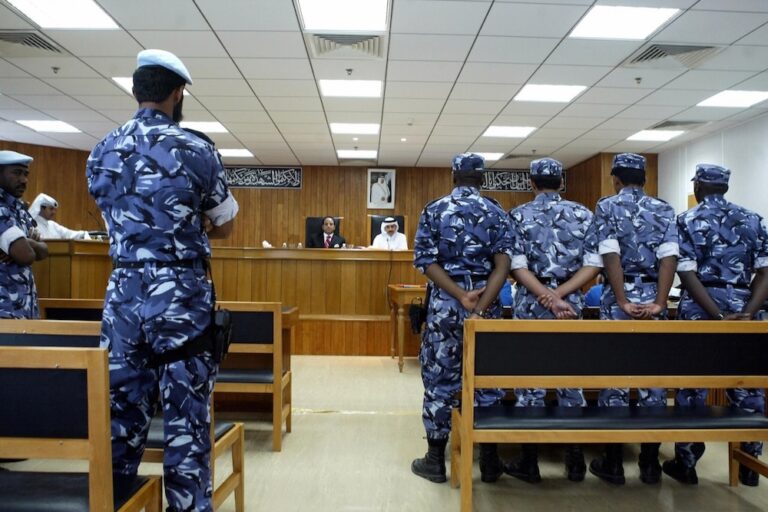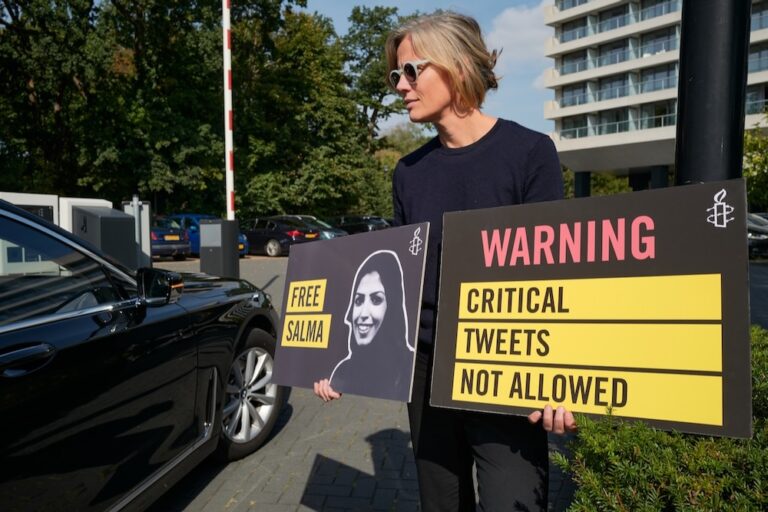The Saudi Civil and Political Rights Association was established in 2009 to promote civil and political rights and to respond to increased arrests following the second Gulf war. The Saudi government, intent on shutting it down, has been systematically targeting members.
This statement was originally published on gc4hr.org on 29 January 2016.
The authorities in Saudi Arabia continue their repeated attempts to dismantle the Saudi Civil and Political Rights Association (ACPRA), in addition to systematically targeting its members, according to the Gulf Centre for Human Rights (GCHR).
The ACPRA was established on 12 October 2009 to promote civil and political rights and to respond to increased arrests following the second Gulf war. Their activities range from open letters and petitions, community outreach events, participating in international human rights activities and direct communications with the relevant authorities in Saudi Arabia. The group aimed to document human rights violations, use the international mechanisms including the United Nations to protect people’s rights, increase the awareness of civil and political rights, empower the marginalised and vulnerable populations, and promote the framework of human rights as a compatible concept with Islamic principles.
A couple of years after its foundation, ACPRA members were targeted by the authorities on charges of inciting public dissent and the information technology crimes law (paragraph one of article 6) has been used to justify charges against ACPRA members. In addition, “ta’azir”, or deciding a penalty by the religious judge as he deems appropriate, has been applied to justify the lengthy imprisonment, lashing, and travel bans applied in sentencing ACPRA members for their peaceful and legitimate human rights activities. Most trials of the members took place at the Specialised Criminal Court (SCC) assigned to cases of allegedly terror-related crimes.
Further to what GCHR has published in the past, including in September 2014, below is an overview of the fate of 11 members of ACPRA to date:
Saleh ben Ashwan Al-Ashwan, an affiliated member of ACPRA, was among the first to raise the case of Saudi citizens imprisoned in Iraq. He was arrested on 07 July 2012 and held to date without trial or access to lawyers. He is currently detained at Al-Hayer political prison in Riyadh without any specific charge directed against him.
Omar Mohammed Al-Saeed, an associate member of ACPRA who is only 25 years old, was arrested on 16 April 2013 during the first session of his interrogation in the city of Buraidah. He was accused of several charges including breaking allegiance with the ruler, joining an unlicensed civil society, inciting public opinion against officials, questioning the supreme scholars and the judiciary, and taking photos of protests and posting them online to spread rumours and false news. He was sentenced by the judge Essa Al-Madrodi at the the Buraidah Criminal Court, without access to his lawyer, to four years in prison and 300 lashes. The verdict was overturned when considered by the Court of Appeal, which then referred the case to the SCC which is assigned to cases related to terrorism and the security of the state. The SCC began its first hearing on 01 October 2015 and ruled against him on 05 November 2015, sentencing him to two and a half years in prison and a travel ban for the same period after completion of his sentence. He was reportedly beaten by an inmate and infected with a disease causing hair loss due to poor standards of hygiene while in his first year of detention. He served his sentence in a prison ward designated for drug-related crimes at Buraidah criminal prison and was released on 22 December 2015, due to time served in detention.
Abdulaziz Al-Shubaili is a principal member of ACPRA. He was summoned to Al-Qassim’s prosecution and interrogation department on 18 November 2013 and interrogated in four sessions, the last one held on 17 December 2013. He was asked by the police to bring someone to bail him out on 14 January 2014. The case then referred to Judge Mohammed Al-Zahrani at the SCC, which held its first hearing on 27 October 2014. The 13th hearing was held on 28 December 2015 and no date was set for the next hearing. He is under a travel ban.
Essa Al-Hamid is a founding member and current President of ACPRA. He was summoned to the Bureau of Investigation and Prosecution in Al-Qassim on 21 November 2013 where he underwent seven interrogation sessions, the last one on 14 January 2014. On 11 March 2014, he was contacted by the police to bring a person to do a bail adversarial. His trial began at the Buraidah Criminal Court before Judge Sulaiman Al-Olaiqi who after two hearings took the surprise decision to refer the case to Judge Mohammed Al-Zahrani at the SCC. This court held 12 hearings including on 20 January 2016, when the case was postponed to 17 February 2016. He is currently banned from traveling.
Sulaiman Al-Rashudi is a former judge, a lawyer and a co-founding member in his 80s. He joined ACPRA in 2009 while serving a lengthy prison sentence for his participation in petitions to demand political reforms. He was a member of the Committee to Defend Legitimate Rights in 1993, and was arrested, detained for two months, banned from travel for five years and his law office was closed for ten years. On 16 March 2004, he was arrested and released after two weeks for participating in a letter requesting constitutional reforms. On 02 February 2007, he was arrested and detained with other reformists from Jeddah for meetings aiming to establish a civil society for political and constitutional reform until his bailed release on humanitarian grounds on 23 June 2011. On 22 November 2011, he was sentenced by the SCC to fifteen years in prison followed by another fifteen years of travel ban. He was convicted of allegedly “breaking allegiance with the King,” alleged involvement in “forming a secret organisation,” “attempting to seize power,” “financing terrorism,” and “money laundering.” Al-Rashudi was arrested on 12 December 2012, hours after the publication of his lecture entitled “The rule of demonstrations and sit-ins in Islamic law,” where he was placed in solitary confinement and subjected to incommunicado detention for two months. He is currently serving his sentence at Al-Hayer political prison in Riyadh.
Mohammed Al-Bajadi is a founding member and a well-known human rights defender who is 35 years old. He has been arrested several times due to his call for solidarity in order to prevent arbitrary detention and torture. He was arrested on 04 September 2007 and released only on 01 January 2008 as he was accused of inciting protests. He was arrested again on 09 January 2008, with the confiscation of his files and passport. He was released on 11 January 2008 but remained barred from traveling. On 21 March 2011, he was arrested and put in solitary confinement for four months. On 16 August 2011, he was tried at the SCC in secret hearings which his lawyers were prevented from attending. On 10 April 2012, the SCC sentenced him to a four-year prison sentence and another four years of travel ban. He was accused of many charges such as allegedly “being in possession of banned books, contesting the independence of the judiciary, harming the image of the state through the media and calling on the families of political detainees to protest, joining a civil society organisation that is not licensed, harming the country’s reputation, questioning the independence of the judiciary, the acquisition of banned books, organising a sit-in for the families of prisoners, supporting the revolution in Bahrain, and communication with foreign organisations.” Al-Bajadi has carried out several hunger strikes to protest the ill-treatment to which he was subjected during his detention, including putting him for four months in solitary confinement. On 06 August 2013, he was suddenly released but was soon jailed again on 15 August 2013. Three years after the first verdict, it was rejected by the Court of Appeal and re-tried again before the SCC, which sentenced him on 05 March 2015 to five years in prison and another suspended five years, in addition to a 10-year travel ban. The latter verdict has been changed according to notes from the Appeals Court to become four years in prison, as well as a four-year suspended sentence and a 10-year travel ban. On 29 November 2015, he was transferred to Prince Mohammed bin Nayef Center for counseling.
Dr. Abdulkarim Yousif Al-Khoder is a professor of comparative jurisprudence in the Islamic studies college in Al-Qassim and a co-founding member of ACPRA. On 24 April 2013, he was arrested prior to the start of the 4th hearing of his trial in Buraidah Criminal Court before Judge Ibrahim Al-Hassani, due to his objection to the judge’s decision to prevent women, including his wife, from entering the courtroom, following which the judge ordered his arrest in response. He was transferred to Buraidah criminal prison where he was subjected to harassment and malnutrition and the lack of the hygiene and the deterioration of health services. On 24 June 2013 he was sentenced to three years in prison and another suspended five years, in addition to a 10-year travel bans after the court found him guilty on charges of allegedly “inciting the public against the ruler, calling for protests, participation in an unlicensed civil society organisation, breaking allegiance with the ruler, and communicating with foreign agencies” on the violations of human rights in Saudi Arabia. On 06 January 2014, the Court of Appeal overturned the first verdict on the condition that the case to be considered by another judge because of a feud between the defendant (Dr. Al-Khoder) and Judge Al-Hassani, who overlooked the case at the very beginning. Before the first hearing of his re-trial at Buraidah Criminal Court, Judge Abdullah Al-Tuwaijri, to whom the case was referred, ordered his release but the judge heading the Buraidah Criminal Court refused to sign it. On 07 May 2014, the first hearing of the trial was held and in the second hearing the court ruled a lack of jurisdiction and referred the case to the SCC. On 07 January 2015, the first hearing of his trial was held at the SCC headed by Judge Khalid bin Muhammad Al-Jasser. On 19 October 2015, he was sentenced to 10 years in prison and another 10 years of travel ban. He is still detained at the Buraidah criminal prison in Al-Qassim province.
Dr. Abdulrahman Al-Hamid is a founding member of ACPRA and a professor of Islamic economy at the technical college in Buraidah. He was summoned on 17 April 2014 for interrogation to the criminal investigation department in Buraidah and notified of an arrest warrant issued by the general bureau of interrogation and prosecution. His arrest came after signing a petition with other activists calling for a trial of the Minister of Interior for his alleged violations of human rights and suppression of public freedoms. In May 2014, he was reportedly transferred to the Buraidah general prison in a ward of drug-related crimes. On 13 October 2015, the SCC sentenced him to 9 years in prison and a fine of 50,000 SAR. He is currently detained in Al-Malaz criminal prison in Riyadh.
Fowzan Al-Harbi, a founding member of ACPRA, is a young engineer and a human rights defender. (See http://www.gc4hr.org/news/view/752). He represented the other members of ACPRA during their trials and participated in the promotion of human rights activities. The first hearing in his trial was on 04 December 2013, at the Criminal Court in Riyadh before the judge Omar Al-Sahan. On 26 December 2014, during the second hearing of his trial, the judge ordered his arrest after he presented part of his response to the indictment in which he explained the inability of the Attorney General for prosecution of those who violate human rights. After the hearing, he was detained for six months at the over-crowded Al-Malaz prison in Riyadh without being assigned a space to rest or sleep. He was released in June 2014 on a pledge not to resume his activities. On 25 June 2013, he was sentenced to one year in prison and another suspended six years. The verdict included also a requirement that he “pledge not to have contact with people and not to write on social network sites.” The charges brought against him include participating in the establishment of an unlicensed organisation (ACPRA), “inciting disobedience to the ruler by calling for demonstrations,” and “accusing the judiciary of being incapable of delivering justice.” On 19 November 2014, a trial session was held and led by Judge Al-Sahan to consider the notes sent by the Court of Appeal about the initial verdict. Al-Harbi was sentenced to 10 years in prison and a 10-year travel ban. He was re-arrested and is now kept in Al-Hayer criminal Prison in Riyadh.
Dr. Abdullah Al-Hamid is an ACPRA founding member and a well-known human rights defender. In 1992, with a group of concerned citizens, Al-Hamid established the Committee to Defend Legitimate Rights, but the authorities dissolved it, expelled the members from their jobs and imprisoned them. Later, he was imprisoned for several periods due to his advocacy for a constitutional monarchy. The first hearing of his trial was held at the Criminal Court in Riyadh before Judge Hammad Al-Omar on 11 June 2012. After a series of joint hearings with his colleague, Dr. Mohammed Al-Qahtani, Al-Hamid was accused on 10 April 2013 of thirteen charges including alleged “promotion of peaceful protests, inciting against the ruler the King) and the supreme scholars, causing public disorder and unrest, false testimonies to foreign organisations, establishing an unlicensed civil society organisation, and calling to break allegiance to the Minister of Interior, prince Nayef.” On 9 March 2013, the judge at the Criminal Court in Riyadh ordered the dissolution of ACPRA and confiscation of all its properties, five years imprisonment of Dr. Al-Hamid in addition to another six years from a previous sentence for violating the pledge not to pursue any further activities. Moreover, he was sentenced to a ten-year travel ban following his release. Al-Hamid is currently spending the third year of his sentence at Al-Hayer prison in Riyadh. He went on hunger strikes several times to object the poor standards of hygiene, improper ward placement, inadequate healthcare access and poor diet.
Dr. Mohammad Fahad Al-Qahtani is a political economy professor and a founding member of APCRA. He was charged on 15 June 2012 with 11 charges including allegedly “inciting dissent and breaking allegiance with the ruler, questioning the integrity of the officials and the supreme scholars, inciting public opinions against the government by accusations of violating the human rights, accusing the judicial and legal system of lack of independence and question their integrity, antagonising the international organisations against the Saudi government by disseminating false information, utilising the United Nations mechanisms to file legal claims against Saudi officials and using the Internet to disseminate opinions, petitions, and statement against the government.” The first hearing of his trial was held at the Criminal Court in Riyadh before Judge Hammad Al-Omar on 18 June 2012. On 9 March 2013, the Criminal Court in Riyadh sentenced him to ten years in prison followed by another ten years of travel ban. Al-Qahtani is currently serving his third year at Al-Hayer prison in Riyadh.
The Gulf Center for Human Rights (GCHR) believes that the targeting of the founding, principal and affiliated members of the ACPRA with arrest and imprisonment after show trials that include fabricated charges violates international human rights law, in addition to the international and national obligations of the Kingdom, in particular as a member of the UN Human Rights Council. The GCHR further believes that failing to grant a formal work permit to ACPRA, and other human rights groups such as Human Rights Monitor in Saudi Arabia (MHRSA) and Adalah Centre for Human Rights, represents further evidence of the pursuit of the Saudi authorities to eliminate the human rights movement and its constructive role in the defense of the people’s rights.
The GCHR urges the authorities of Saudi Arabia to:
- Immediately and unconditionally release all detained members of ACPRA as well as other detained human rights defenders and drop all charges or reservations against them;
- Grant a permit to ACPRA, MHRSA, Adalah Centre and other NGOs in order for them to do their legitimate and peaceful human rights work without any restriction;
- Refrain from any kind of reprisals against human rights activists who co-operate with the international mechanisms including the UN system; and
- Guarantee in all circumstances that all human rights defenders in Saudi Arabia are able to carry out their legitimate human rights activities without fear of reprisals and free of all restrictions including judicial harassment.
The GCHR respectfully reminds the authorities in Saudi Arabia that the United Nations Declaration on the Right and Responsibility of Individuals, Groups and Organs of Society to Promote and Protect Universally Recognized Human Rights and Fundamental Freedoms, adopted by consensus by the UN General Assembly on 9 December 1998, recognizes the legitimacy of the activities of human rights defenders, their right to freedom of association and to carry out their activities without fear of reprisals.
We would particularly draw your attention to Article 6 (c) “Everyone has the right, individually and in association with others: (c) To study, discuss, form and hold opinions on the observance, both in law and in practice, of all human rights and fundamental freedoms and, through these and other appropriate means, to draw public attention to those matters” and to Article 12.2, which provides that “the State shall take all necessary measures to ensure the protection by the competent authorities of everyone, individually and in association with others, against any violence, threats, retaliation, de facto or de jure adverse discrimination, pressure or any other arbitrary action as a consequence of his or her legitimate exercise of the rights referred to in the present Declaration”.


